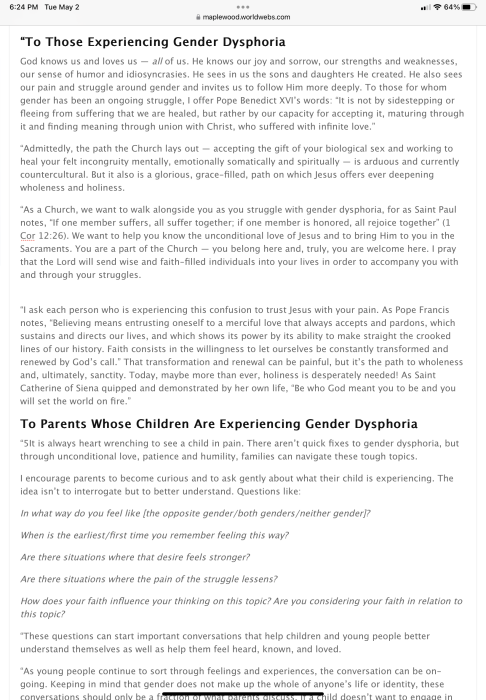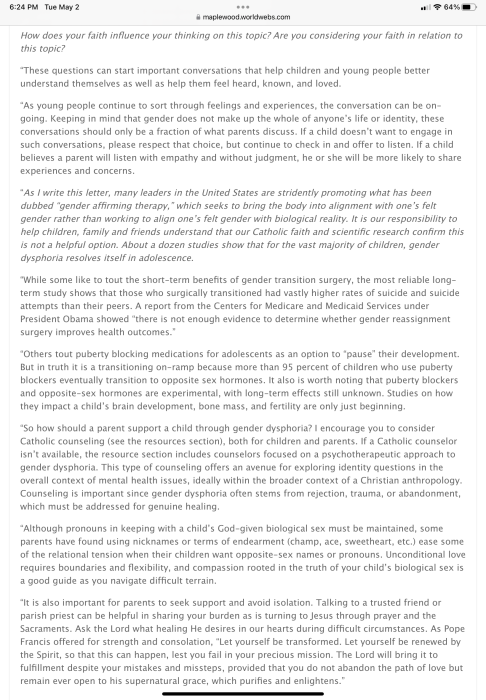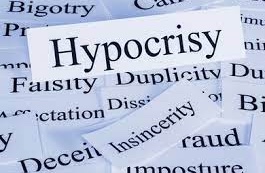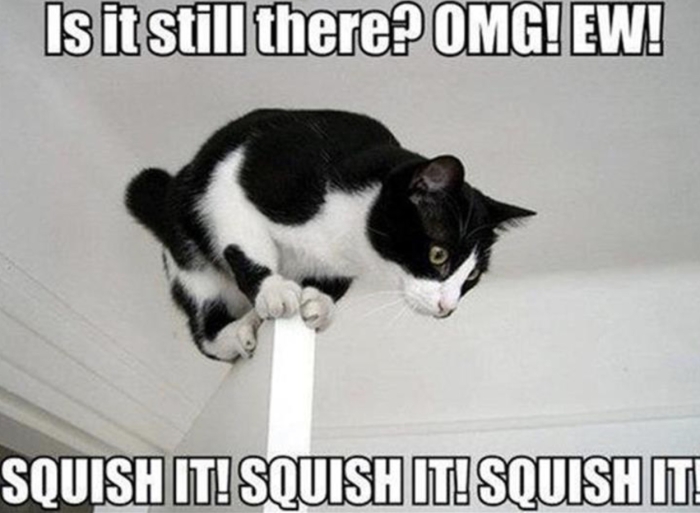Pope Francis, Catholics, and Christians in the news worldwide
mtierney said:
Just when everybody was focused on the war in Europe, immigration chaos, Trump redeux, and the Biden Family Drama, this slipped under the door.
And if your takeaway from this article is just this:
"Persons who identify as transgendered are created by God, are loved by God, and we as faithful Christians are called to love each of them as our neighbor "
then I think we're good.
tjohn said:
And if your takeaway from this article is just this:
"Persons who identify as transgendered are created by God, are loved by God, and we as faithful Christians are called to love each of them as our neighbor "
then I think we're good.
Who are we to judge what Ms. Mtierney's takeaway is?
nohero said:
Who are we to judge what Ms. Mtierney's takeaway is?
I am overwhelmed by the number of folks who did not get past page one — if that— of this beautifully written statement. It bravely offers parents of children a pathway for speaking of gender dysphoria with their children — not an issue for teachers to manage.
Give yourselves a treat — read on and ask yourselves, as parents, if you want your children to make decisions based on what strangers advise them to do.
mtierney said:
nohero said:
Who are we to judge what Ms. Mtierney's takeaway is?
I am overwhelmed by the number of folks who did not get past page one — if that— of this beautifully written statement. It bravely offers parents of children a pathway for speaking of gender dysphoria with their children — not an issue for teachers to manage.
Give yourselves a treat — read on and ask yourselves, as parents, if you want your children to make decisions based on what strangers advise them to do.
It's not just a statement directed to parents. You're missing the main point of the piece.
mtierney said:
It bravely offers parents of children a pathway for speaking of gender dysphoria with their children — not an issue for teachers to manage.
Give yourselves a treat — read on and ask yourselves, as parents, if you want your children to make decisions based on what strangers advise them to do.
You may not be aware that this argument - that gender dysphoria is something "imposed" on children by teachers or "strangers" - is the basis of hate speech and bigotry against transgender adults.
But, now you know.
nohero said:
You may not be aware that this argument - that gender dysphoria is something "imposed" on children by teachers or "strangers" - is the basis of hate speech and bigotry against transgender adults.
But, now you know.
So, if a group of adults, with whom your children interact, conclude that your cilld may be in the wrong gender, they may offer their advice to your child on how to switch genders without informing their family because of the fear that, when adult, these trans kids will be subjected to ‘hate speech.” Convoluted reasoning to justify allowing vulnerable and/or impressionable kids to seek guidance from outside the family unit.
From the earlier link…
The adults don’t conclude, the child does.
My objection to the ‘beautifully written piece’ however isn’t anything to do with its topic. I found myself physically hurt (truly) and crying at how our Jewish Torah has been so mistranslated and twisted to fit the Christian prosetylising (sp) message. That is NOT beautiful, authentic, honest, ethical or fair use.
mtierney said:
nohero said:
You may not be aware that this argument - that gender dysphoria is something "imposed" on children by teachers or "strangers" - is the basis of hate speech and bigotry against transgender adults.
But, now you know.
So, if a group of adults, with whom your children interact, conclude that your cilld may be in the wrong gender, they may offer their advice to your child on how to switch genders without informing their family because of the fear that, when adult, these trans kids will be subjected to ‘hate speech.” Convoluted reasoning to justify allowing vulnerable and/or impressionable kids to seek guidance from outside the family unit.
You're repeating ignorance that you heard from somewhere, and whoever you heard it from was either ignorant or (just as likely) deliberately engaging in hate speech. Which is what I told you before, but you decided to post that response to me anyway.
Well since it’s so easy to brainwash conservatives into believing trumpenstein is their Massiah… they believe an adult, any woke adult, can convince your child to change their sex…I really cannot believe this siht is happening in America today. Idiocy!
It’s complicated
https://www.nytimes.com/2022/05/21/world/europe/kirill-putin-russian-orthodox-church.html
from the link…
The Russian Orthodox Leader at the Core of Putin’s Ambitions
Patriarch Kirill I has provided spiritual cover for the invasion of Ukraine, reaping vast resources for his church in return. Now, in an extraordinary step, the E.U. is threatening him with sanctions.

- Published May 21, 2022Updated May 22, 2022
“As Russia’s invasion of Ukraine unfolded, Patriarch Kirill I, the leader of the Moscow-based Russian Orthodox Church, had an awkward Zoom meeting with Pope Francis.
“The two religious leaders had previously worked together to bridge a 1,000-year-old schism between the Christian churches of the East and West. But the meeting, in March, found them on opposing sides of a chasm. Kirill spent 20 minutes reading prepared remarks, echoing the arguments of President Vladimir V. Putin of Russia that the war in Ukraine was necessary to purge Nazis and oppose NATO expansion.
“Francis was evidently flummoxed. “Brother, we are not clerics of the state,” the pontiff told Kirill, he later recounted to the Corriere della Sera newspaper, adding that “the patriarch cannot transform himself into Putin’s altar boy.”
“Today, Kirill stands apart not merely from Francis, but from much of the world. The leader of about 100 million faithful, Kirill, 75, has staked the fortunes of his branch of Orthodox Christianity on a close and mutually beneficial alliance with Mr. Putin, offering him spiritual cover while his church — and possibly he himself — receives vast resources in return from the Kremlin, allowing him to extend his influence in the Orthodox world.”
mtierney said:
It’s complicated
https://www.nytimes.com/2022/05/21/world/europe/kirill-putin-russian-orthodox-church.html
"Pope Francis met briefly with Metropolitan Anthony of Volokolamsk, director of external relations for the Russian Orthodox Church.
"The pope's prayer requests and his meeting with the Russian Orthodox official came just three days after he told reporters the Vatican has a 'mission' underway to promote peace in Ukraine, although he said it was too soon to provide details. Ukrainian and Russian officials said their governments were not involved. ...
"A brief statement on the website of the Moscow Patriarchate of the Russian Orthodox Church said Anthony traveled to Rome, with the blessing of Russian Orthodox Patriarch Kirill, 'for a brief working visit'."
mtierney said:
While back in D.C.,…
https://www.newsweek.com/fbis-catholicism-memo-no-laughing-matter-opinion-1797641
I thought you were in favor of persecuting religious communities that nurture violent extremists, or was that only in the case of Muslims?
mtierney said:
While back in D.C.,…
https://www.newsweek.com/fbis-catholicism-memo-no-laughing-matter-opinion-1797641
That’s a terribly dishonest article, and it’s fitting that it begins by quoting NJ’s Jeff Van Drew, one of the more self-serving liars in Congress.
nohero said:
It's not even that "detailed and nuanced". You reference the Nicene Creed - in the Creed, and in the Gospels, and in the other New Testament writings, there's the important "nuance" that Jesus is God. And Jesus has "full agency" to choose to go forward with what happened.
Now that we are (presumably) far enough away from Easter for ridskis overly precious scruples, I wonder how you square this position with Christ's famous words "My God, my God, why hast thou forsaken me?" spoken from the cross.
Surely God isn't just talking to himself?
A violent response to a peaceful post. Typical.
I am trying to imagine the amount of performative hysteria you would display if I were to suggest that I was going to squish you.
GoSlugs said:
nohero said:
It's not even that "detailed and nuanced". You reference the Nicene Creed - in the Creed, and in the Gospels, and in the other New Testament writings, there's the important "nuance" that Jesus is God. And Jesus has "full agency" to choose to go forward with what happened.
Now that we are (presumably) far enough away from Easter for ridskis overly precious scruples, I wonder how you square this position with Christ's famous words "My God, my God, why hast thou forsaken me?" spoken from the cross.
Surely God isn't just talking to himself?
For starters, that phrase is a quote from the beginning of Psalm 22. There are various ways that both the psalm, and the reference in the Gospels during the crucifixion, have been interpreted. One way is to note that while the psalm begins with a cry of despair, it ends more hopefully.
As for why Jesus is praying at all, that goes back to the "both God and human" aspect that isn't something easily explained.
By the way, this Sunday in Catholic and most other Christian churches the gospel reading is from the first part of John 14, during the Last Supper. In those passages, Jesus says, "Have I been with you for so long a time and you still do not know me, Philip? Whoever has seen me has seen the Father. How can you say, ‘Show us the Father’? Do you not believe that I am in the Father and the Father is in me? The words that I speak to you I do not speak on my own. The Father who dwells in me is doing his works. Believe me that I am in the Father and the Father is in me." So there's that, too.
nohero said:
For starters, that phrase is a quote from the beginning of Psalm 22. There are various ways that both the psalm, and the reference in the Gospels during the crucifixion, have been interpreted. One way is to note that while the psalm begins with a cry of despair, it ends more hopefully.
As for why Jesus is praying at all, that goes back to the "both God and human" aspect that isn't something easily explained.
By the way, this Sunday in Catholic and most other Christian churches the gospel reading is from the first part of John 14, during the Last Supper. In those passages, Jesus says, "Have I been with you for so long a time and you still do not know me, Philip? Whoever has seen me has seen the Father. How can you say, ‘Show us the Father’? Do you not believe that I am in the Father and the Father is in me? The words that I speak to you I do not speak on my own. The Father who dwells in me is doing his works. Believe me that I am in the Father and the Father is in me." So there's that, too.
Thanks for the response. It's a rare treat (online at least) to talk with a Christian who has read the bible.
I probably need to think on this for a bit but my immediate impulse is to question the value of a physical sacrifice by an omnipotent entity. I mean, it seems to come down to this. If Christ and God are one omnipotent creature at the moment of the crucifixion, then how is his (their?) sacrifice significant? If, on the other hand, they are two separate creatures, one omnipotent and the other in unimaginable pain, then how is that part of God that we call "The Father" not, at best, negligent and, at the worst, a sadist? It all feels a bit like he's trying to have his cake and eat it too.
Also, an unrelated question that comes to mind in all of this is whether Christ is also, in that moment, the Holy Spirit and what does that mean (showing some theological ignorance here, maybe there is a well known answer).
GoSlugs said:
Thanks for the response. It's a rare treat (online at least) to talk with a Christian who has read the bible.
I probably need to think on this for a bit but my immediate impulse is to question the value of a physical sacrifice by an omnipotent entity. I mean, it seems to come down to this. If Christ and God are one omnipotent creature at the moment of the crucifixion, then how is his (their?) sacrifice significant? If, on the other hand, they are two separate creatures, one omnipotent and the other in unimaginable pain, then how is that part of God that we call "The Father" not, at best, negligent and, at the worst, a sadist? It all feels a bit like he's trying to have his cake and eat it too.
Also, an unrelated question that comes to mind in all of this is whether Christ is also, in that moment, the Holy Spirit and what does that mean (showing some theological ignorance here, maybe there is a well known answer).
All of this is how human beings take in and talk about something which we can't fully understand. Not that it helps, but the (imperfect) description is "One God in three persons", which we label "Father", "Son", and "Holy Spirit". So Christ is "Son" and the Holy Spirit is "Holy Spirit" and all three are "God" (singular).
GoSlugs said:
Thanks for the response. It's a rare treat (online at least) to talk with a Christian who has read the bible.
I probably need to think on this for a bit but my immediate impulse is to question the value of a physical sacrifice by an omnipotent entity. I mean, it seems to come down to this. If Christ and God are one omnipotent creature at the moment of the crucifixion, then how is his (their?) sacrifice significant? If, on the other hand, they are two separate creatures, one omnipotent and the other in unimaginable pain, then how is that part of God that we call "The Father" not, at best, negligent and, at the worst, a sadist? It all feels a bit like he's trying to have his cake and eat it too.
Also, an unrelated question that comes to mind in all of this is whether Christ is also, in that moment, the Holy Spirit and what does that mean (showing some theological ignorance here, maybe there is a well known answer).
One thing I like about Catholicism is that it takes death seriously. Christianity in general does, but Catholicism in particular (crucifixes are not something one generally finds in Protestant churches). The central message of Christianity, as I've always understood it, is one of radical love and empathy -- the divine actually becoming a mere mortal. I appreciate the stark contrast this presents with so many other theologies that stress the awesome power of god/gods, where worship is given the same way a peasant might offer their meager tribute to a tyrant, in the slim chance of currying some favor or at least avoiding a blow. The fact that we die is, I'd argue, the most salient attribute of mortal existence -- for the divine to simply become human wouldn't be to fully enter humanity if the death part were avoided.
Now, one might then ask why it is that humans die in the first place. And I'll admit I don't find the canonical theological answer (original sin) to be a very good one. Better to just say "we don't know" I think. But as a guidepost for human nature -- if the ultimate power chose radical empathy to the point of experiencing death itself, then what right do we mortals have to bully and tyrannize and seek power over one another -- I find it a powerful idea.
The whole ‘original sin’ bit has always baffled me; it certainly wasn’t the way I was taught (ie that all humanity is tainted as a result).
What was even more frustrating as a student was learning gospels in Scripture classes at a Methodist school with a chaplain quoting Old Testament, and translating those Torah chapters myself at cheder 3 times a week, picking up all the mistranslations and cultural misunderstandings Christianity got wrong. Then covering the same ground again in my Uni history course. Sigh.
PVW said:
One thing I like about Catholicism is that it takes death seriously. Christianity in general does, but Catholicism in particular (crucifixes are not something one generally finds in Protestant churches). The central message of Christianity, as I've always understood it, is one of radical love and empathy -- the divine actually becoming a mere mortal. I appreciate the stark contrast this presents with so many other theologies that stress the awesome power of god/gods, where worship is given the same way a peasant might offer their meager tribute to a tyrant, in the slim chance of currying some favor or at least avoiding a blow. The fact that we die is, I'd argue, the most salient attribute of mortal existence -- for the divine to simply become human wouldn't be to fully enter humanity if the death part were avoided.
Now, one might then ask why it is that humans die in the first place. And I'll admit I don't find the canonical theological answer (original sin) to be a very good one. Better to just say "we don't know" I think. But as a guidepost for human nature -- if the ultimate power chose radical empathy to the point of experiencing death itself, then what right do we mortals have to bully and tyrannize and seek power over one another -- I find it a powerful idea.
There's a Catechism section for that -
Catechism of the Catholic Church - IntraText (vatican.va)
"Death is the end of earthly life. Our lives are measured by time, in the course of which we change, grow old and, as with all living beings on earth, death seems like the normal end of life. That aspect of death lends urgency to our lives: remembering our mortality helps us realize that we have only a limited time in which to bring our lives to fulfillment ..."
Jaytee said:
Religion exists because of death.
And death exists because we're human. So, we could say that religion exists because we're human.
joanne said:
The whole ‘original sin’ bit has always baffled me; it certainly wasn’t the way I was taught (ie that all humanity is tainted as a result).
What was even more frustrating as a student was learning gospels in Scripture classes at a Methodist school with a chaplain quoting Old Testament, and translating those Torah chapters myself at cheder 3 times a week, picking up all the mistranslations and cultural misunderstandings Christianity got wrong. Then covering the same ground again in my Uni history course. Sigh.
And there are two creations in Genesis. Phil Collins is in neither.
Featured Events
-
Stephen Whitty Presents - Hometown Movie Stars: The Celebrated Actors Of CHS
May 6, 2024 at 7:00pm






























Just when everybody was focused on the war in Europe, immigration chaos, Trump redeux, and the Biden Family Drama, this slipped under the door.
https://www.catholicnewsagency.com/news/254210/bishop-paul-coakley-of-oklahoma-releases-pastoral-letter-on-gender-dysphoria-and-the-transgender-movement
from the link…..
“To Those Experiencing Gender Dysphoria
God knows us and loves us — all of us. He knows our joy and sorrow, our strengths and weaknesses, our sense of humor and idiosyncrasies. He sees in us the sons and daughters He created. He also sees our pain and struggle around gender and invites us to follow Him more deeply. To those for whom gender has been an ongoing struggle, I offer Pope Benedict XVI’s words: “It is not by sidestepping or fleeing from suffering that we are healed, but rather by our capacity for accepting it, maturing through it and finding meaning through union with Christ, who suffered with infinite love.”
“Admittedly, the path the Church lays out — accepting the gift of your biological sex and working to heal your felt incongruity mentally, emotionally somatically and spiritually — is arduous and currently countercultural. But it also is a glorious, grace-filled, path on which Jesus offers ever deepening wholeness and holiness.
“As a Church, we want to walk alongside you as you struggle with gender dysphoria, for as Saint Paul notes, “If one member suffers, all suffer together; if one member is honored, all rejoice together” (1 Cor 12:26). We want to help you know the unconditional love of Jesus and to bring Him to you in the Sacraments. You are a part of the Church — you belong here and, truly, you are welcome here. I pray that the Lord will send wise and faith-filled individuals into your lives in order to accompany you with and through your struggles.
“I ask each person who is experiencing this confusion to trust Jesus with your pain. As Pope Francis notes, “Believing means entrusting oneself to a merciful love that always accepts and pardons, which sustains and directs our lives, and which shows its power by its ability to make straight the crooked lines of our history. Faith consists in the willingness to let ourselves be constantly transformed and renewed by God’s call.” That transformation and renewal can be painful, but it’s the path to wholeness and, ultimately, sanctity. Today, maybe more than ever, holiness is desperately needed! As Saint Catherine of Siena quipped and demonstrated by her own life, “Be who God meant you to be and you will set the world on fire.”
To Parents Whose Children Are Experiencing Gender Dysphoria
“5It is always heart wrenching to see a child in pain. There aren’t quick fixes to gender dysphoria, but through unconditional love, patience and humility, families can navigate these tough topics.
I encourage parents to become curious and to ask gently about what their child is experiencing. The idea isn’t to interrogate but to better understand. Questions like:
In what way do you feel like [the opposite gender/both genders/neither gender]?
When is the earliest/first time you remember feeling this way?
Are there situations where that desire feels stronger?
Are there situations where the pain of the struggle lessens?
How does your faith influence your thinking on this topic? Are you considering your faith in relation to this topic?
“These questions can start important conversations that help children and young people better understand themselves as well as help them feel heard, known, and loved.
“As young people continue to sort through feelings and experiences, the conversation can be on- going. Keeping in mind that gender does not make up the whole of anyone’s life or identity, these conversations should only be a fraction of what parents discuss. If a child doesn’t want to engage in such conversations, please respect that choice, but continue to check in and offer to listen. If a child believes a parent will listen with empathy and without judgment, he or she will be more likely to share experiences and concerns.
“As I write this letter, many leaders in the United States are stridently promoting what has been dubbed “gender affirming therapy,” which seeks to bring the body into alignment with one’s felt gender rather than working to align one’s felt gender with biological reality. It is our responsibility to help children, family and friends understand that our Catholic faith and scientific research confirm this is not a helpful option. About a dozen studies show that for the vast majority of children, gender dysphoria resolves itself in adolescence.
“While some like to tout the short-term benefits of gender transition surgery, the most reliable long-term study shows that those who surgically transitioned had vastly higher rates of suicide and suicide attempts than their peers. A report from the Centers for Medicare and Medicaid Services under President Obama showed “there is not enough evidence to determine whether gender reassignment surgery improves health outcomes.”
“Others tout puberty blocking medications for adolescents as an option to “pause” their development. But in truth it is a transitioning on-ramp because more than 95 percent of children who use puberty blockers eventually transition to opposite sex hormones. It also is worth noting that puberty blockers and opposite-sex hormones are experimental, with long-term effects still unknown. Studies on how they impact a child’s brain development, bone mass, and fertility are only just beginning.
“So how should a parent support a child through gender dysphoria? I encourage you to consider Catholic counseling (see the resources section), both for children and parents. If a Catholic counselor isn’t available, the resource section includes counselors focused on a psychotherapeutic approach to gender dysphoria. This type of counseling offers an avenue for exploring identity questions in the overall context of mental health issues, ideally within the broader context of a Christian anthropology. Counseling is important since gender dysphoria often stems from rejection, trauma, or abandonment, which must be addressed for genuine healing.
“Although pronouns in keeping with a child’s God-given biological sex must be maintained, some parents have found using nicknames or terms of endearment (champ, ace, sweetheart, etc.) ease some of the relational tension when their children want opposite-sex names or pronouns. Unconditional love requires boundaries and flexibility, and compassion rooted in the truth of your child’s biological sex is a good guide as you navigate difficult terrain.
“It is also important for parents to seek support and avoid isolation. Talking to a trusted friend or parish priest can be helpful in sharing your burden as is turning to Jesus through prayer and the Sacraments. Ask the Lord what healing He desires in our hearts during difficult circumstances. As Pope Francis offered for strength and consolation, “Let yourself be transformed. Let yourself be renewed by the Spirit, so that this can happen, lest you fail in your precious mission. The Lord will bring it to fulfillment despite your mistakes and missteps, provided that you do not abandon the path of love but remain ever open to his supernatural grace, which purifies and enlightens.”